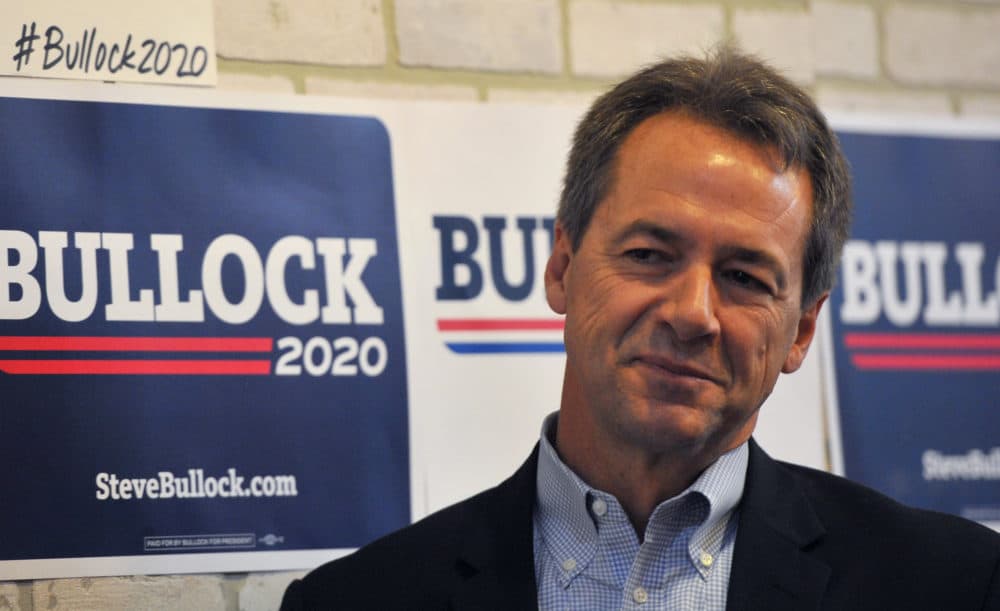Advertisement
Who's Running For President In 2020?
Montana Governor And Presidential Candidate Steve Bullock Explains Why He's Running In 2020

Democratic presidential candidate and Montana Gov. Steve Bullock says one reason he's best equipped to defeat President Trump in 2020 is something the two have in common.
"In order to win in 2020, we've got to win back some of the places that voted for Trump," says Bullock, who leads a state Trump won by more than 20 points in the 2016 election. "I know it's possible, I've done it. I've also been able to bridge the divides that we have."
Bullock, one of nearly two dozen Democrats mounting a bid for the party's nomination, has twice been elected governor in Montana. He says working with the state's majority-Republican legislature has prepared him well to take on partisan division in Washington, D.C.
"We've been able to get progressive things done, from health care to 100,000 Montanans, to record investments in education, freezing college tuition," he tells Here & Now's Jeremy Hobson. "Also, more than probably anyone in the field, I've taken on what I think really holds us back in D.C., and that's corrupting influence of outside dollars into our elections."
Bullock (@GovernorBullock) says recent abortion bills in states like Alabama represent misguided attempts to overturn settled law at the national level.
"Fundamentally — I mean, Roe versus Wade set out the course pretty darn well 45 years ago, and I think that's what we should be following," he says. "As opposed to attacking women's health, we could figure out ways to promote it."
Interview Highlights
On how he would approach issues like coal and climate change, coming from a state where coal is important to the economy
"First when President Obama ... came out with the Clean Power Plan, we actually came together and said, 'Here's how we can attain it.' Then in the final rule, they actually increased our emissions reductions almost twofold. So I was frustrated that he moved the goalposts, but also turned around and said, 'We'll work to get there.' I mean there's no debate: climate change, it's a direct threat to our way of life. We have to be immediate and durable [with our] responses. What we've seen with coal, market forces are already making use of coal unprofitable. But as even the [U.N. Intergovernmental Panel on Climate Change] report set forth, it's not practical to completely end coal use in the near term. Plants aren't going to close overnight.
"In order to win in 2020, we've got to win back some of the places that voted for Trump. I know it's possible, I've done it."
Steve Bullock
"We need to do everything we can to mitigate harmful effects of coal-power emissions as we transition. And that's what we've done in Montana, both doubling wind, quadrupling solar. But it's also critical that we support those hardworking communities at the center of that transition. I mean these are folks who've worked their whole lives to power our country, and now many Democrats and others, they act like they're really part of the problem. ... We have to be able to show working people that Democrats are on their side."
On the ongoing trade war with China
"We have to get tough on China. But ... America First has become America alone. And I know that [agriculture] producers in Montana are getting hit on lack of a market. They're also getting hit on the inputs. If they want to buy a new tractor, steel and aluminium is more expensive. So there's no doubt that we need to be tough on China. But the way that he's approaching it is just, 'Well we'll do it alone with a blunt instrument of tariffs,' and that's not going to get us there.
"What I would do is actually bring the global community together and say that if it's going to be tech, you can't turn around and say, 'All right, you have to transfer all the tech if it's going to be built in China.' If it's going to be trade, it's actually going to be, 'You have to open up fair trade just as the expectations are that we'd do.' I mean I think that they're playing a long game. The thought that even what the president announced yesterday is, 'We'll give farmers some subsidies for those lost markets.' Don't kid yourself. In Montana and Iowa and everywhere else, that payment isn't going to make up for when countries like Brazil then end up getting some of the market share. It'll impact us for years and years and years to come."
Advertisement
On Treasury Secretary Steve Mnuchin saying Harriet Tubman wouldn't replace former President Andrew Jackson on the $20 during the Trump administration
"I think the discussion ... what's even more problematic in some ways is, when there was a transition to put Harriet Tubman on, saying, 'OK, we're not even going to have that discussion anymore' — I think that is problematic. And I think what we've seen of the current administration is really trying to divide people, and pour gasoline on the divisions in this country that we already have. That's no way to run a country."
Jill Ryan produced this interview and edited it for broadcast with Tinku Ray. Jack Mitchell adapted it for the web.
This segment aired on May 24, 2019.
